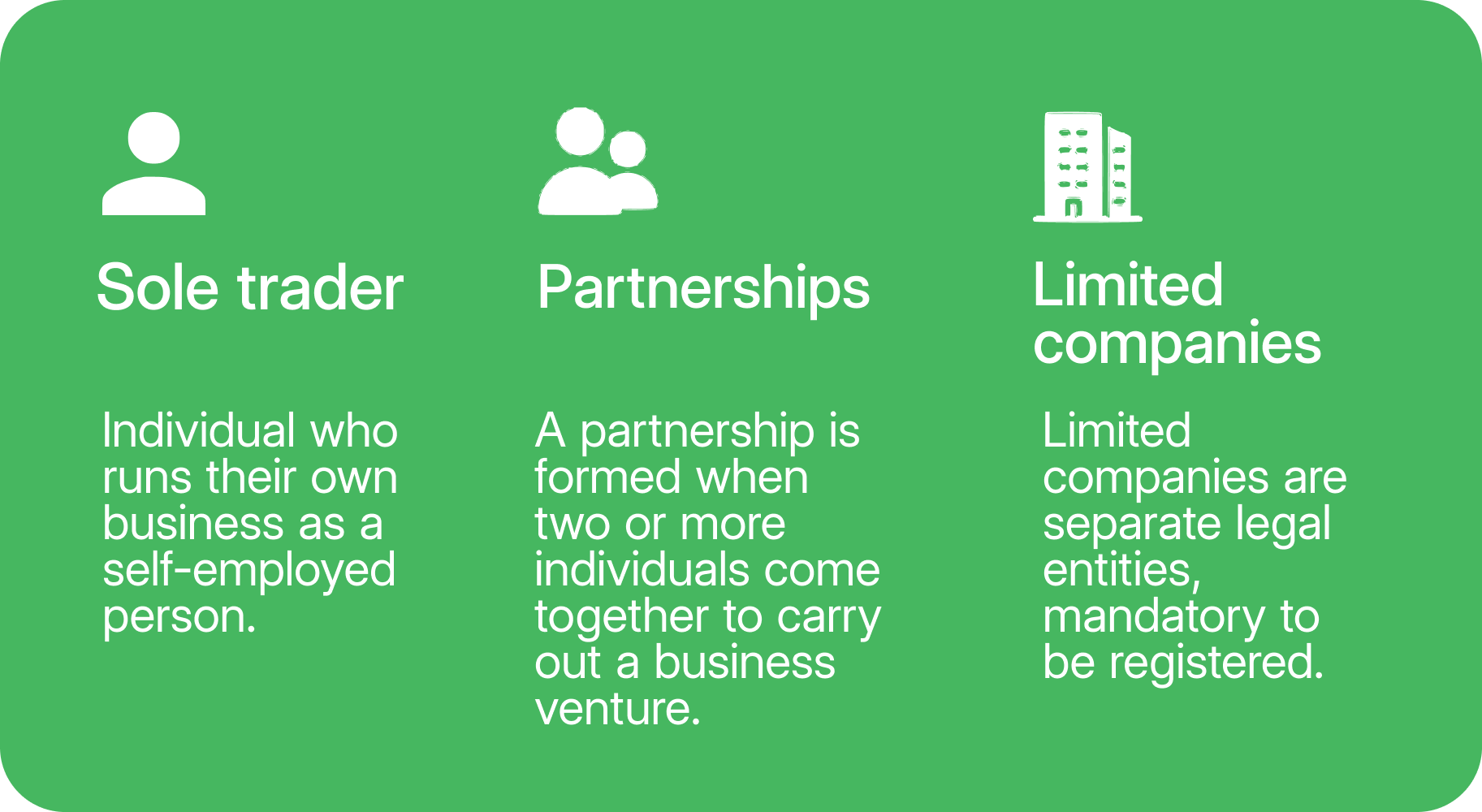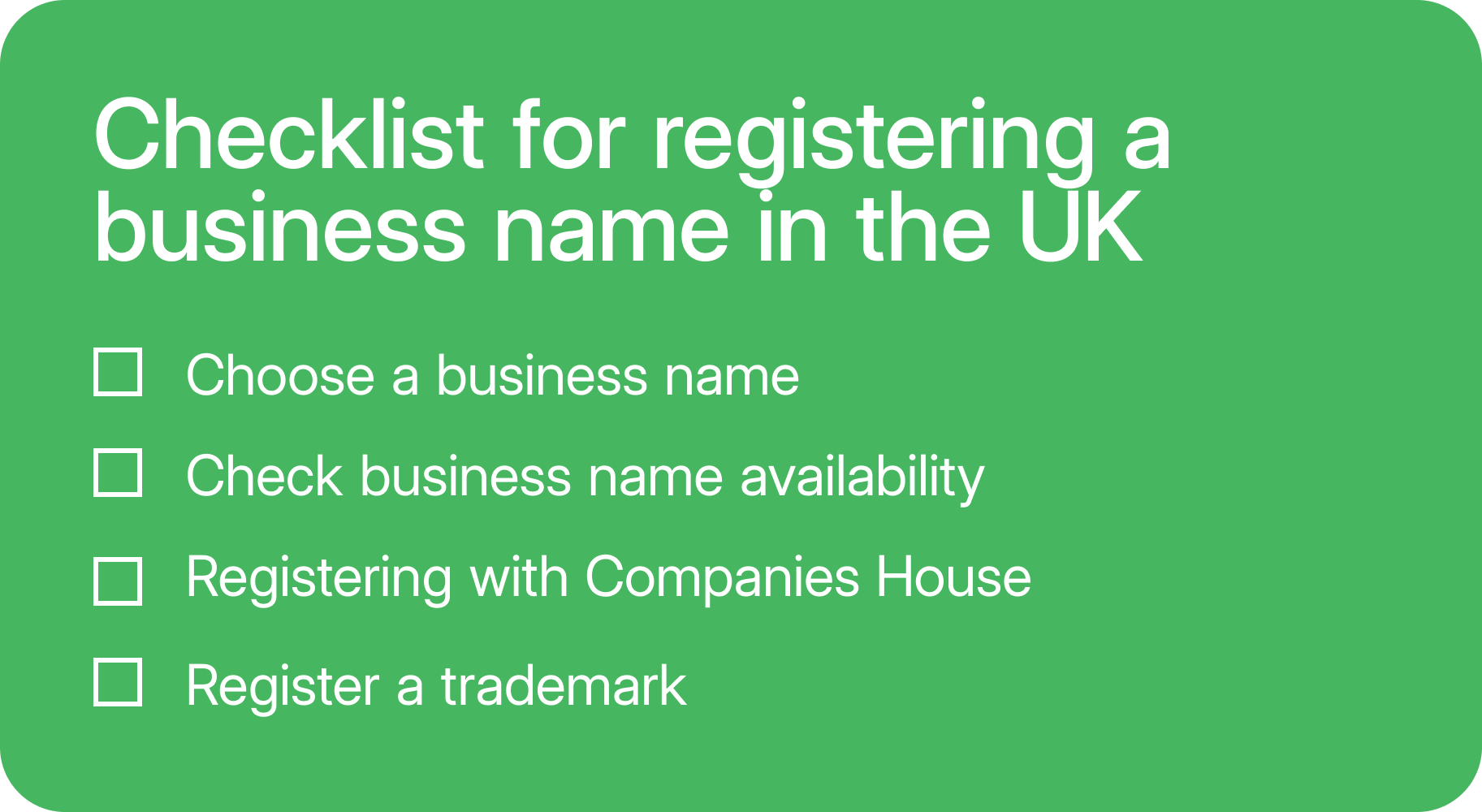
Registering a business name is a crucial step for entrepreneurs in the United Kingdom.
Whether you plan to be a sole trader, strike up a partnership, or run a limited company, registering your business name offers numerous benefits beyond mere branding.
From distinguishing personal and business activities to building trust and credibility with customers, the process plays a vital role in your success.
In this article, we'll explore the types of businesses that need to register business names, why registration is important, and the simple steps to register a business name in the UK.
Let’s dive in.
What types of businesses need to register a name?
Registering a business name is a legal requirement for certain types of businesses in the UK and there are three main business types that typically need to register:
Sole traders
A sole trader is an individual who runs their own business as a self-employed person.
As a sole trader, you are not required to register your business as a separate legal entity. But if you want to operate under a name other than your own (as most entrepreneurs do), you must register your business name.
So if you opened a pizza restaurant and wanted to name it Mikes Pizza, you'd have to register a name.

Partnerships
A partnership is formed when two or more individuals come together to carry out a business venture.
Like sole traders, partnerships have the option to operate under a business name.
But it’s not particularly common for entrepreneurs in the food and beverage industry to use their legal names because it’s typically not memorable or catchy enough.
Registering a partnership business name is important for similar reasons as registering a sole trader's business name. But one area of importance is that it helps distinguish the partnership's activities from the personal activities of the partners.
This can be particularly important if dealing with legal disputes where one partner is in the wrong.
Limited companies
Unlike sole traders and partnerships, limited companies are separate legal entities.
When registering a limited company, it is mandatory to register a business name with Companies House. This process ensures that your chosen business name is unique and not already in use by another registered company.
Business name registration is particularly important for limited companies as it:
- Helps protect the interests of other businesses by preventing multiple companies from operating under similar names, reducing confusion in the marketplace.
- Enables customers, suppliers, and investors to easily identify and engage with your company.
- Provides legal protection for your company's brand and intellectual property rights.

Why you need to register a business name
While we briefly touched on the reasons why you need to register a business name above, let’s expand on why these reasons are important.
In particular, there are five main reasons why you should register a business name.
1. Legal requirements
Registering your business name is a legal obligation for the business types we mentioned above.
Failure to comply with this requirement can result in penalties, fines, or legal disputes.
But by registering your business name, you demonstrate your commitment to operating within the legal framework and fulfilling the necessary regulatory obligations.
2. Protection of intellectual property.
Registering a business name provides you with valuable protection for your brand and intellectual property.
When you register your business name, it becomes exclusively associated with your business.
This prevents others from using a similar or identical name, reducing the risk of brand confusion or infringement. Consequently, it helps you safeguard your reputation, market position, and market share from unauthorised use by competitors.
3. Building trust and credibility.
Would you trust a restaurant to put effort into their food and drinks if they haven’t bothered to think of a creative name that conveys their passion? Probably not.
When people see that your business has a registered name, it gives them assurance that you are a legitimate and professional entity. It conveys stability, seriousness, and a commitment to long-term business operations.
In turn, this enhances your reputation, attracts more customers, and opens doors to new opportunities and partnerships.
4. Establishing a distinct identity.
Through business name registration, you establish a unique and recognisable identity in your local market.
Your business name becomes an essential part of your brand and marketing strategy. It allows you to create a consistent and memorable presence across your website, marketing materials, social media, and other communication channels.
A strong and distinct business name can set you apart from your competitors and leave a lasting impression on your target audience.
5. Expanding your business.
As your business grows and expands, a registered business name becomes even more important.
Having a registered business name adds professionalism and credibility to your growth plans, making it easier to secure partnerships, funding, and contracts with larger clients.
Thereby helping you expand into new markets, offer new products or services, and attract investors or financial institutions.
How to register a business name in the UK
Registering your business name in the UK may seem confusing at first, but it’s a relatively straightforward process.
Follow these four simple steps and you’ll be good to go:
1. Choose a business name
Start by selecting a unique and memorable business name that aligns with your brand.
Consider factors such as the relevance to your niche, ease of pronunciation and spelling, and its ability to resonate with your target audience. But make sure to avoid names that are too similar to existing businesses to prevent confusion or potential legal issues.
If you need a hand, you can try a business name generator.
2. Check business name availability
Before proceeding with the registration process, conduct a thorough search to ensure your chosen business name is not already registered or trademarked by another entity.
You can check the availability of business names through the Companies House website or by using their online search tool.
It's also worth checking for any existing trademarks to avoid potential infringement.
3. Registering with Companies House
To officially register your business name, you'll need to submit the necessary documentation to Companies House.
The registration process also varies depending on the type of business structure.
Limited companies will need to complete an application for incorporation, providing details such as the company name, registered address, directors, and shareholders. You'll also need to pay the required registration fee.
On the other hand, registration for sole traders and partnerships is much easier. Simply register your business name as part of your self-assessment tax registration or partnership tax return.
You can typically do this online through the HM Revenue and Customs (HMRC) website.
4. Register a trademark
While not mandatory, registering a trademark can provide additional protection for your business name as it gives you exclusive rights to use your business name in relation to the goods or services you provide.
This step can help safeguard your brand and prevent others from using a similar name.
To register a trademark, you can apply through the Intellectual Property Office (IPO) website.

Now you're ready for business
Registering your business name is an essential step towards building a successful venture in the food and beverage industry.
It not only fulfils legal requirements but also safeguards your brand, builds credibility, and supports future growth.
As you embark on your restaurant journey, consider exploring business tools like Otter.
With its seamless integration of online orders into one single hub, simple menu management, and invaluable sales insights, Otter can streamline your operations and provide a competitive edge.
Get a head start in your niche by trying Otter today.